 When I turned on my television around this time last year, I didn’t realize that I was witnessing a white supremacist rally less than two hours from my home in Virginia. My then-10-year old daughter, whose eyes were also glued to the television, asked me, “Why are those people screaming at everyone? This looks really scary, mommy.”
When I turned on my television around this time last year, I didn’t realize that I was witnessing a white supremacist rally less than two hours from my home in Virginia. My then-10-year old daughter, whose eyes were also glued to the television, asked me, “Why are those people screaming at everyone? This looks really scary, mommy.”
Forced to calm her anxieties, I would later realize that “scary” would be an understatement. Throughout the day, the protests became more violent, eventually resulting in the senseless death of 32-year old paralegal Heather Heyer, who was viciously mowed down by the vehicle of an alt-right supporter. Days later, President Trump would issue a lackluster statement, blaming both sides of protestors for the civil unrest.
The upcoming weekend will remind our nation of what transpired that day, especially as alt-right supporters prepare to march in the nation’s capital. The reason these white supremacist supporters feel validated to commemorate one of America’s darkest days is largely due to the administration’s apparent disinterest in redressing racial discord and Congress’ hesitation to mitigate racial inequality.
A year after the Charlottesville riots, racialized political platforms, vitriolic rhetoric, racist micro-aggressions and rollbacks on Obama-era public policies are furthering the disenfranchisement and alienation of people of color in America. And among this flurry of activity, one must wonder if the U.S. is avoiding a refreshed assessment of racial inequality and the systemic variables, such as the wealth gap, predatory lending and policing, and unequal housing and workforce opportunities that flow from such conditions.
As we reflect on that dreadful day of the Charlottesville riots, this review of the nation’s integrity around race is long overdue. Moreover, an exercise toward racial healing, much like the Kerner Report in the 1960s, might also encourage Congress to set a political agenda that underscores the importance of more constructive race relations in the age of Trump. To summarize the words of Reverend Dr. Martin Luther King, Jr. in one of his many prophetic books, “[i]n the days ahead, we must not consider it unpatriotic to raise certain questions about our national character.”
Race relations since Charlottesville
As they piqued my daughter’s interest, the 2017 riots did force conversations about white supremacy in this country. After Trump’s tepid response, corporate leaders resigned from government-organized industry councils. Leaders from Merck pharmaceuticals, Intel, Under Armour, and Walmart, among other companies publicly expressed their discontent with the administration’s response.
Contrary to his boss, Attorney General Jeff Sessions called the murder of Heather Heyer “domestic terrorism” and expressed the DOJ’s intent to prosecute the offenders.
Many white families and friends could not avoid unpacking the complex application of white supremacy and racism in their daily lives, something that had been buried behind the nostalgia of the nation’s first African-American president. Last year, I read a blog post from Jason Linkins that spoke to this raised consciousness among certain white Americans:
“But we—I mean white people—can’t take the easy way out any longer. We can’t keep burdening our fellow citizens—by which I mean people of color and all those who end up the target of this suicide cult—with the load to bear. We have to take a greater share of responsibility for ensuring that no one else falls victim to the bewildering seductive predations of Richard Spencer and his ilk, and we have to rededicate ourselves to building a more just and equitable society in which we can all live.”
Clearly, a positive takeaway from the Charlottesville riots is that similar conversations expanded into workplaces, at local coffee shops, and at dinner tables across the country.
But that was then, what about now?
Since last August, however, as it became clear that the rioters would receive very little admonishment from the nation’s key leaders, a new normal has seeped into American life. It’s called living while black, and it’s the uglier side of what these riots left behind. Despite already paying the price of general admission into mainstream life, African-Americans are currently being victimized by the shameful behavior of white racists who call the police when they are shopping, dining, sleeping, grilling, walking, driving, and even selling lemonade in front of their homes. In some instances, these micro-aggressions have turned physical, resulting in blacks being beaten in Waffle Houses, physically accosted, and sometimes killed by law enforcement or citizens claiming to ‘stand their ground’.
Despite many of these incidents being recorded, shared from mobile devices, and generating public outrage, there has been no respite from racist attacks large and small. And some of them are coming from the highest reaches of the American government. Over the past 12 months, Americans have witnessed an administration whose rhetoric has become extremely unpleasant when it comes to race relations, describing immigrants as “animals or gang members,” black congressional representatives as having “low IQ,” and majority black nations as “shithole” countries.
During this same period, the children of immigrant families have been separated from their parents who are being subjected to deportation. Russian operatives have effectively used social media platforms to suppress the black vote and stir racial tensions in the wake of other high-profile events. Black professional athletes have been admonished for being unpatriotic because they refuse to kneel before the American flag. Countries with predominantly brown populations have been threatened with walls. The Voting Rights Act is still under harsh legal attacks, 53 years after its enactment.
Affirmative action policies that apply to colleges and universities have been rolled back, potentially hindering the opportunities for students of color in places of higher education. Stringent federal travel bans are still being legally upheld as they restrict citizens from Muslim countries from traveling to the U.S.
While these actions are just a few examples of what this administration has been up to since the Charlottesville riots, they speak loudly to the “scary” place that my daughter described—one that will have a deleterious impact on people of color and other vulnerable populations in the years to come.
Why we need another Kerner Commission
The administration’s actions also speak to their incapability of facilitating a constructive conversation on U.S. race relations, which is why Congress needs to act.
I’ve argued in previous blog posts about the need to revamp the Kerner Commission to generate a 21st century review and outlook on race relations. In the 1960s, President Lyndon B. Johnson commissioned the Kerner Report, amid 163 protests erupting around the country due to the mistreatment of African-Americans by the police. An 11-member National Advisory Commission on Civil Disorders (aka, the Kerner Commission), led by Illinois Governor Otto Kerner, Jr., was convened. Its mission was to examine the root causes of racial discord, which led to the issuance of a final report, surfacing some critical findings about racism and its residual effects. The report also offered some indication for how white supremacy and racism were playing out in the daily lives of African-Americans.
While some critics have argued that the Kerner Report did very little to effectuate change, it did reveal how racial inequality led to disparate funding to local institutions within the black community (e.g., schools). The report addressed how elevated levels of segregation experienced after the Civil Rights Movement led to overly concentrated black poverty and social isolation. The Kerner Report also explicitly laid out the role of white attitudes toward blacks in maintaining these power structures.
Earlier this year, the Eisenhower Foundation revisited the Kerner Report and noted some improvement for African-Americans while cautioning readers about economic inequality. But given that the Charlottesville riots were squarely about spewing racial hate, Congress—which earlier this year passed a resolution in response to this—should steward a new federal advisory commission, comprised of experts, advocates, and practitioners to revisit how far we’ve come and where we are headed in this area.
While averting riots may keep the cameras away from the plight facing African-Americans, the nation needs to address many social, economic, and political challenges that include but go far beyond racists chanting with Tiki torches. The litmus test on the nation’s ability to foster more effective race relations in the future depends on this.
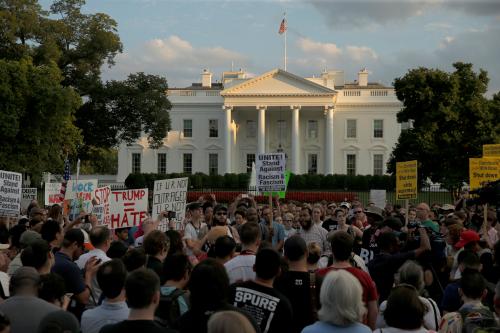
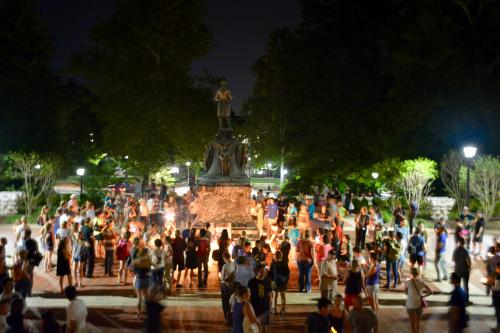
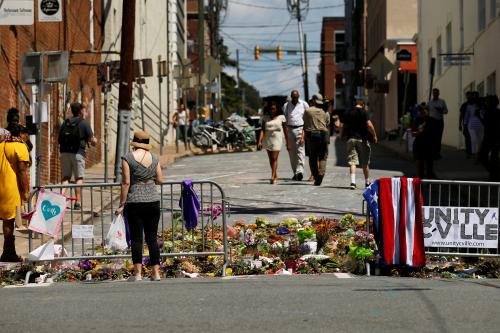


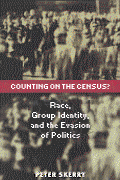

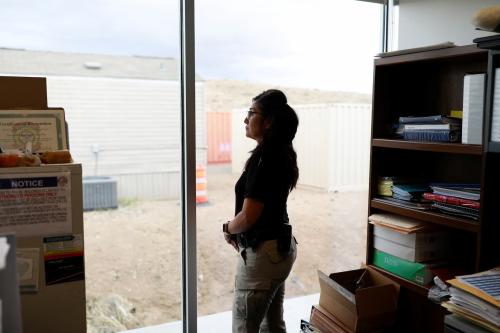

Commentary
One year after the Charlottesville riots and still no new Kerner Commission
August 9, 2018